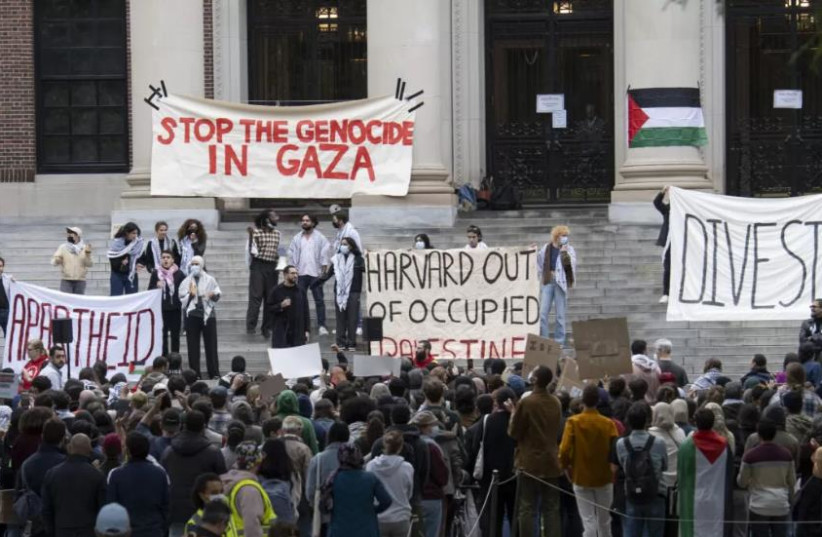In the wake of the October 7 Hamas terror attack, the unimaginable has become routine, particularly on university campuses. Jewish students are being openly excluded from campuses, targeted for violence and harassment and forced to either fight back or endure some of the most obscene instances of marginalization and demonization Jews have faced since Nazi Germany was on the rise.
The stories are legion at this point, from masked and armed Hamas supporters stalking the campus of the University of California, Los Angeles, to mobs of Jew-haters chasing Jewish students off other campuses or into hiding on campuses to university faculty facilitating and advising the campus groups that torment Jews with the goal of driving them off campus and into silence.
These are not isolated incidents. They are national campaigns to effectively make university campuses Judenrein.
What is happening on campuses also hearkens back to this country’s ugly history in the post-Reconstruction era, where groups of civilian vigilantes teamed up with government actors to deprive emancipated African Americans of their newly obtained constitutional and federal rights.
Long after slavery was abolished in the United States, it was not uncommon in parts of the country to see mobs, often affiliated with the Ku Klux Klan, work with local officials to deprive Blacks of the right to speak, assemble and participate in government programs like public education. They carried out this campaign in a familiar fashion: hiding behind masks and employing weapons, the groups, with the backing of local law enforcement, school officials or even political office holders, showed up in large numbers to intimidate Blacks from going to schools or even voting.

It was a horrifically effective campaign.
Thankfully, laws were enacted to confront this menace and those laws still exist. Today, the laws, often known as the “KKK Laws,” are used to combat everything from police brutality and election interference to, just this year, infringing on access to abortion facilities.
Department of Justice refuses to enforce laws to protect Jewish students
The problem is that while the United States Department of Justice has had no problem enforcing these laws against individuals and groups that they oppose, such as pro-life protesters, they have steadfastly refused to enforce the laws to protect Jewish students who are under the most formidable and widespread antisemitic assaults this country has ever seen.
Hopefully, that will soon change.
On behalf of 28 other organizations, Zachor Legal Institute (zachor means “remember”) recently sent an enforcement request to Attorney-General Merrick Garland in late March. The request consisted of a history of the KKK Laws, documentation on how groups like Students for Justice in Palestine have coordinated and executed mass deprivations of rights of Jewish students, and detailed analysis of how the KKK Laws apply to, and should be enforced against, student groups and faculty that are effectuating the deprivations of rights.
This request, if acted on, will result in criminal investigations (and punishment) against those who are hunting down and depriving Jewish students of fundamental rights. It does not seek to silence speech; it seeks to protect vulnerable students while ensuring that everyone on campuses has equal opportunities to exercise their rights.
What we are seeing across the country, and particularly on university campuses, is a redux of the KKK era, with groups like Students for Justice in Palestine taking the role of the Klan, even down to donning masks and bearing arms, to deprive Jews of fundamental rights like attending classes at a public university or speaking out on campus in defense of the Jewish people.
The United States is a nation of laws, reinforced by the rule of law, yet Jewish students are being abandoned by the system and suffering something far worse than being called by the wrong pronoun. As an activist organization seeking the equal protection of laws for Jewish students, Zachor Legal Institute and our allied organizations will not stand idly by as the country descends into a morass of terror-supported campaigns to deprive Jews of basic rights.
As the son of a Holocaust survivor who was also deprived of her basic rights in Europe, I have a very personal stake in ensuring that what my mother survived will never happen again, particularly in the country that saved her life.
Only the Department of Justice can enforce the laws meant to ensure that all Americans can exercise their constitutional and federally protected rights. The ball is now in the court of the attorney-general and the entire Biden administration.
We hope that Congress will join our coalition’s call that the Justice Department enforce existing civil rights laws and ensure that modern day Klansmen in keffiyeh are not allowed to make universities no-go zones for Jewish students.
The writer is president of the Zachor Legal Institute.
